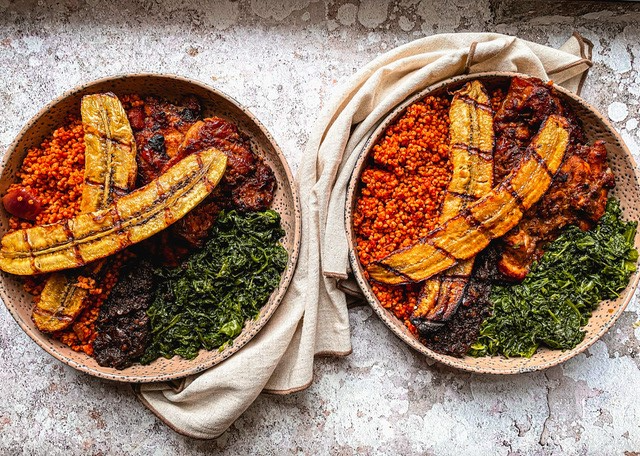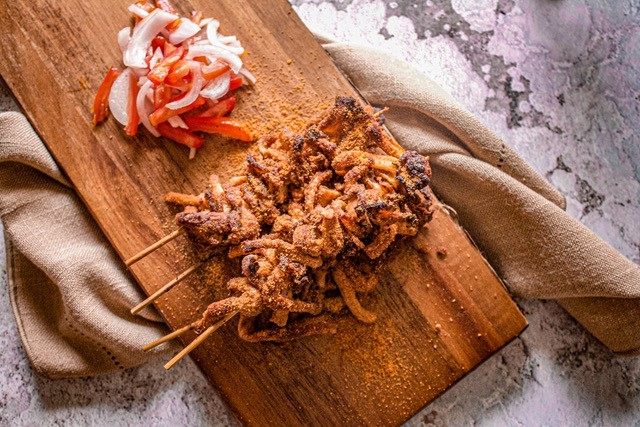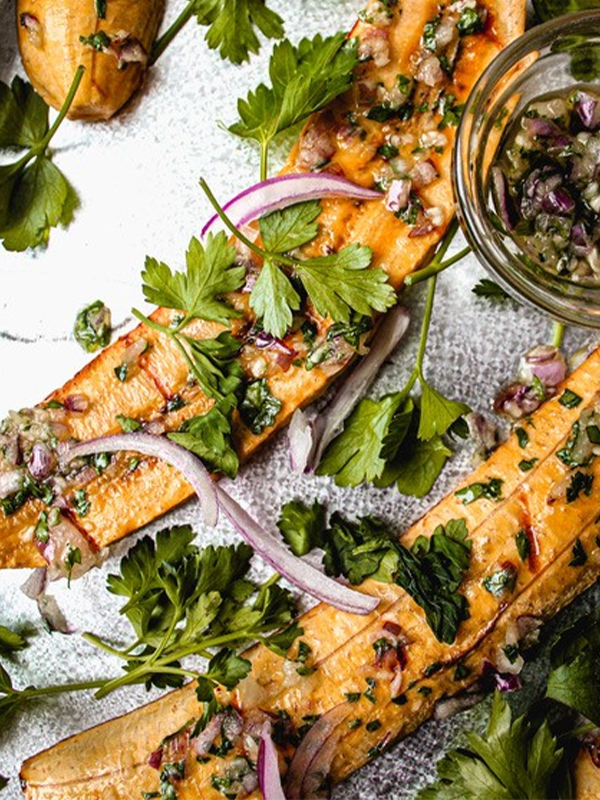We’ve seen it before. Boxes and boxes of plastic containers filled with pale chicken or salmon, brown rice and broccoli. You guessed it: It’s someone showcasing their “healthy” meal prep, and it’s screaming for some seasoning.
Many have come to associate this as the aesthetic of wellness, subscribing (in many cases literally) to the theory that unseasoned is synonymous with healthy. Those of us who grew up in households with plates of jollof, warm stews or savory collard greens know otherwise.
But since the rest of the world hasn’t caught up yet, misconceptions around these foods from the African diaspora still persist—like the idea that they are all laden with carbohydrates and prepared with an excessive amount of oil.
Bryanne Hackman, an African Agriculture, Nutrition & Development expert, says this false narrative often happens because there’s a lack of knowledge when it comes to the nutritional profiles of these classic dishes found on Black dinner tables. “Many African foods contain properties that are just as healthy as or even far superior than foods widely promoted in the mainstream world as ‘healthy foods,’” says Hackman.
When she realized healthy recipes and meal plans did not include food from her Ghanaian culture, Hackman launched her digital platform, Best Body Africa, to do just that.
Her recipes incorporate African grains like fonio and amaranth, which Hackman says “contain health properties that could surpass commonly consumed grains in Western countries.” Hackman also adds that the baobab fruit, which is widely eaten in West Africa, has more antioxidants than blueberries. And the list continues: Pumpkin leaves, frequently used in African soup dishes, are high in Vitamin A and C. The Ethiopian grain used in injera has been heralded as a superfood due to its high protein levels. And hibiscus drinks, also prevalent across the Caribbean, are rich in antioxidants and vitamin C.

“It’s important to shine a light on these foods not only for people to reap benefits from them but to bust the common myth that African foods are not healthy,” says Hackman.
For many of us, soul food decorates long tables filled with family members on Sundays and holidays. It’s also a genre of cuisine that has been under media scrutiny for being the cause of unhealthy eating habits in the Black community. Soul food was named as the culprit for high hypertension and obesity rates.
Adrian Miller, author of Soul Food: The Surprising Story of An American Cuisine, is working to promote a similar perspective for Black Southern American cuisine.
“What I often tell people is that you have to put the whole cuisine into context and not have a limited view of it,” says Miller.
Miller says most of the foods we associate with soul food are the festive meals. Usually involving fried chicken, barbecue, baked macaroni and cheese. The dishes that contain greens, beans and peas often get left out of the conversation. “If you talk about the celebration food of any culture, it is not meant to be eaten [regularly],” he says.
Miller adds that the kind of food nutritionists are recommending are already abundant in soul food cooking: dark, leafy greens, sweet potatoes, fish, and okra which is a superfood. “A lot of these things are the building blocks of our traditional cuisine,” says Miller. “That’s another signal that it’s about how this food is prepared and the context.”

In many cases, access is a big part of the problem. Many Black communities, often the result of racial and socioeconomic disparities, tend to have fewer supermarkets that offer a variety of fresh produce. And even those with greater access will often struggle to find the traditional food they’re looking for.
“Unfortunately, when [society is] not talking about wellness in a diverse way, people of African descent don’t see their foods represented in mainstream solutions,” says Hackman, who is also an agriculture and food policy analyst. “This further reduces demand for African foods.”
And in spite of these hurdles, health-conscious cooking has always existed across Afro-diasporic cultures. More Black people may be turning to diets like veganism, but plant-based lifestyles across the diaspora are nothing new.
Troy Levy, the owner of Chef Troy’s Table, preserves traditions of the ital lifestyle—born from Jamaican rasta culture. When the Rastafari people were outcast by the majority population, they began to create vegetarian/vegan dishes with the fresh foods around them. The diet portion of the ital lifestyle is primarily a strict vegetarian diet that is low in salt and sugar.
Levy provides catering services and cooking demonstrations for dishes like jerk portobello mushrooms, ackee hummus and breadfruit croquettes. Sticking to ital principles, he heightens the flavor in his foods without added salt or sugar. He often dehydrates onions and ginger, so there’s extra spice and natural sodium.
Levy hails from Glengoffe in Jamaica—the countryside where he was heavily influenced by his Rasta uncles. It was because of them that he looks at food through a medicinal lens. Levy is always keeping in mind the impact that food has on both the physical and the mental.
“They had to find ways to spice and flavor things without going to the shop and going to the market,” says Levy. “They would make spices by blending ginger, garlic, honey and different things. I always try to reiterate the importance of keeping the integrity of how we prepare our food in the Caribbean.”
With this kind of integrity top of mind, Levy’s been able to stay connected to his culture, but he also hasn’t been afraid to change. We’re not living like our ancestors, so we may have to adjust how we eat our classic dishes to fit our present-day lifestyles.
As Levy says, we don’t have to look anywhere else because “we already have everything that we need.”







